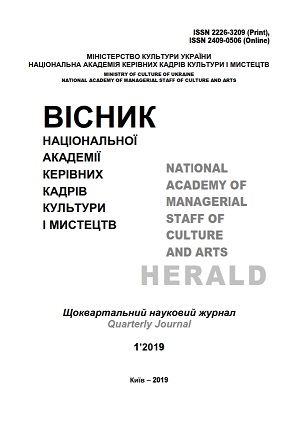Східнохристиянські (візантійські) стимули проторенесансних позицій європейської культури й музики Середньовіччя та Відродження
East Christian (Byzantine) Incentives of the proto-Renaissance Traditions of European Culture and Music of the Middle Ages and the Renaissance
Author(s): Olga Viktorivna MuravskayaSubject(s): Christian Theology and Religion, Cultural history, Music, Middle Ages, Culture and social structure , 16th Century, 17th Century, Sociology of Religion, History of Art
Published by: Національна академія керівних кадрів культури і мистецтв
Keywords: Byzantium; Byzantine culture; medieval revival; Renaissance; East Christian culture;
Summary/Abstract: The purpose of the article is to highlight the phenomenon of the influence of the Eastern Christian tradition on the pan-European cultural area of the Middle Ages and Renaissance, which determines the interdependence of world cultures, including music, in which artistic and creative transformation is a symbol and image of the world. The methodology of the work is complex and is built on the unity of means of the cultural, historical-typological, hermeneutical and musical-aesthetic type of research. The scientific novelty of the work is determined by the fact that it first systematized the data of scientific literature regarding the Eastern Christian (Byzantine) culture-making factor in the formation of European medieval Renaissance, as well as the artistic and musical Renaissance area. Conclusions. The history of medieval non-Byzantine revivals (Ostrogothic, Carolingian, Ottоn, 12th-century revival) is traced, revealing the significant role of the Eastern Christian component represented by or through the early Christian European traditions and the spiritual and ascetic experience of Ireland, Gaul, Britain, or directly through Byzantium. The influence of the latter is noted by the cult of scholarship, the development of not only Latin but also Greek, associated with the high liturgical practice, active translation activities, thanks to which works of Eastern Christian patriotism were introduced into the theological everyday life of Western Christianity. The role of the Academies, which united the intellectual, highly educated, encyclopedic erudite European elite grouped around the monarch and his Christian empire, is essential. Interesting is the interest in ancient heritage, but with the dominant role of the Christian cosmos and the adaptation in it of the ideas of Neo-Platonism, which in turn will later determine the spiritual-philosophical and artistic specifics of the Italian Renaissance of the XIV-XVI centuries, the genesis of which was also formed by the Greek-Byzantine elite.
Journal: Вісник Національної академії керівних кадрів культури і мистецтв
- Issue Year: 2019
- Issue No: 1
- Page Range: 242-247
- Page Count: 6
- Language: Ukrainian

